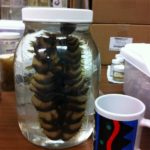 Eminent marine biologist John Stuart Gray passed away last October, which I posted on at that time. He was a professor of marine biology at University of Oslo, Norway, studying the ecology of the meiobenthos and the effects of pollution on marine communities. The meiobenthos is the community of small animals ranging in size from roughly 0.05 to 2 mm in practice. I never knew him personally, but his and his colleague’s research formed part of the foundation of experimental benthic ecology read by every deep sea (and hopefully shallow) biologist. In addition to his general ecology work and that on the biology of meiogfauna, he made landmark studies on the effects of pollution on marine sediment communities, demonstrating, among other things, their slow recovery.
Eminent marine biologist John Stuart Gray passed away last October, which I posted on at that time. He was a professor of marine biology at University of Oslo, Norway, studying the ecology of the meiobenthos and the effects of pollution on marine communities. The meiobenthos is the community of small animals ranging in size from roughly 0.05 to 2 mm in practice. I never knew him personally, but his and his colleague’s research formed part of the foundation of experimental benthic ecology read by every deep sea (and hopefully shallow) biologist. In addition to his general ecology work and that on the biology of meiogfauna, he made landmark studies on the effects of pollution on marine sediment communities, demonstrating, among other things, their slow recovery.
Warwick and colleagues published an obituary for John Gray in Marine Ecology Progress Series this month. They described some of his many honors and appointments and close with the following statement:
“John was a brilliant and enthusiastic lecturer and teacher, and pursued his teaching and research activities right up until his passing. In addition to his scientific accomplishments he provided much hospitality, humour and support to the marine science community. His students will remember him as a wonderful mentor, who taught by example and shared not only his scientific knowledge, but also his attitude and wisdom, and the capacity to enjoy both science and the finer things in life such as good food and wine!”
I would like to add that even those “students” of yours that you never knew will remember the high quality research and will continue to learn from and cite your work for many many years to come. Future students will stumble upon his work cited in some of their favorite papers and will continue to learn from him, how to develop and test hypotheses in marine ecology and develop an appreciation for the little guys.






As a relatively junior faculty member in the marine science community, I can hardly hope to beat the epitaph of “a wonderful mentor, who taught by example and shared not only his scientific knowledge, but also his attitude and wisdom, and the capacity to enjoy both science and the finer things in life such as good food and wine!” Indeed, we should all seek such a fond farewell into the great unknown.
I met John Gray once at a conference in Germany. He approached me after an oral presentation about a deep corals and said “Calcite. Not aragonite.”.
He was referring to a statement I had made about a bamboo coral, a deep-sea octocoral with a calcareous skeleton. The question has plagued me ever since, actually, because the material can change with time, and some animals produce both.